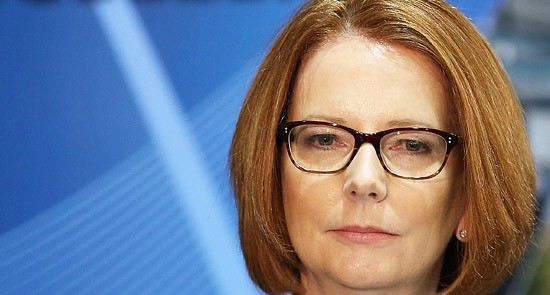
Whatever the public’s beef is with the federal government, it sure doesn’t seem to be about policies.
The latest polling by Essential Research asked what people thought of 14 major legislative reforms made by the Labor government in the past few years. They were pretty happy with 13 of them — and even the one that was considered a dud, the carbon tax, continues its creeping rehabilitation with voters.
The results indicate Julia Gillard’s woes — today’s Newspoll in The Australian puts Labor in the death zone at 29% primary support — may not have been primarily caused by dissatisfaction with Labor’s legislative actions.
The public is very positive about DisabilityCare (63% thought it was “good for Australia”, 9% “bad” — stronger support than when the question was asked last September) and expanding dental health for people on low incomes (73% good; 8% bad). Lifting the tax-free threshold was another winner — although who doesn’t like paying less tax?
Support was also strong for lifting the age pension and increasing the superannuation rate to 12% (which is underway).
Down a few rungs came policy reform which the public was positive about overall, but there was more opposition. The Gonski education reforms were rated good by 46% of those polled, while 22% rejected them. These numbers have softened considerably since last September, when 54% rated the reforms good and just 8% said “bad”. (In an aside, the federal Coalition’s pledge to repeal Gonski should it win the election is not a massive vote-winner at this stage; Essential found 32% of those polled approved of the repeal plan, while 44% disapproved. Unsurprisingly, Labor and Green voters strongly disliked the repeal plan, while 51% of Coalition voters supported it.)
The NBN posted 48% “good” to 28% “bad” — very similar numbers to the mining tax, which was described somewhat encouragingly as “introducing a tax on the large profits of mining companies”, which is probably not how industry lobbyist Mitch Hooke would describe it. Abolishing WorkChoices is a plus for Labor — 42% rated the move as positive versus 27% negative.
That leaves the government’s bete noire as the carbon tax; 32% thought it was good to 48% bad. But opposition to the tax is softening; when Essential asked the question in September, it was 28:51%. The numbers now show about half those polled thought the tax was a good idea or “neither good nor bad”, while the other half thought it was a bad idea.
Whether the slow dissolution of the public’s dislike of the carbon tax helps Labor on election day is another question. Essential, which polled just over 1000 people, found Labor is sitting on an election-losing two-party-preferred result of 45%-55% in the Coalition’s favour. The voting numbers have changed little this month, with Labor’s primary support at 34% to the Coalition’s 47%. The Greens remain on 8%.
Interestingly, Essential’s findings caution against any wannabe senators counting on the public voting a different way in the Senate to how they vote in the House of Representatives. Punters were asked if they would vote for the same party in both houses; 67% said they’d plump for the same party, 9% thought they’d pick a different one, 24% didn’t know. Greens voters were more inclined to vote differently, Labor voters less so, and Coalition voters were the least inclined to shop their vote around.








Popular policies up against an unpopular opposition leader with none..
Somethings got to give.. interesting times..
Listening to Murdochs Australian Newspoll is very much a fox looking after the chickens story.
I’m looking forward to many many years of a big tax free pension. Thanks first to modern medicine, second to P. Costello but also, very much, to P. Keating (no other Treasurers come close). But I am a taxpayer and 60 per cent of my fellow citizens are not net taxpayers (maybe adjust just a little for GST, I forget but the point remains largely unaffected). So may I be just a trifle cynical, but I’ll settle for permission to be realistic.
Why wouldn’t most voters, while pretending to be highminded, interested in the difficult aim of objective fairness, and even generous, vote for their own self-interest by voting to have others pay for the disabled, the children of dumb parents who are to be given equal opportunity by some hitherto undiscovered magic (about which we know one thing: it involves the ritual of burning $100 notes very fast in a silvan glade smelling of mixed aromatics including those related to pot),
What do policies have to do with anything? Rupert says she’s a ranga and has a big bum, what other information is required to vote against her. Game over.
… more money for dentists (not least those who will do a production line job on the hitherto undentisted because their charms don’t get them enough of the rich as customers), etc.?
We are of course far more complex than any simple cyncism allows for and many people, both young and old, don’t vote for their own economic self-interest(or that of their family short or long term) often not knowing or caring whether they are doing so. Come to think of it Treasury officials of any sophistication must be quite conscious of the need to keep things complex so (a) they have control of the agenda and of their political masters; (b) no ordinary citizen can have much idea as to who are winners and who are losers in any detail; (c) everyone can be given some goodie which they don’t really think they deserve or have earned so they will be less likely to examine what others are getting too closely. (It makes the reform achievements starting in NZ under Labour’s Roger Kerr and continued under Hawke, Keating, Howard and Costello pretty remarkable. Things aren’t nearly bad enough now for any comparable reforms to be undertaken without too much political pain – and,anyway, neither Abbott or Turnbull are principled economic “dries” (Hockey may just be edging in that direction and Andrew Robb can’t be entirely ruled out despite his background in the politics of winning elections).
Whatever we say to Essential and however we vote surely we can’t generally be so dumb as not to notice that Gillard’s supposed achievements are motherhood stuff except for the missing adult element that they need a lot of money to pay for them and their is nothing the government has done which makes that likely to be possible without the paid (and economic damage) of taking a lot from the productive to pay for transfers and government programs. That surely is the realistic view of Gillard’s record.